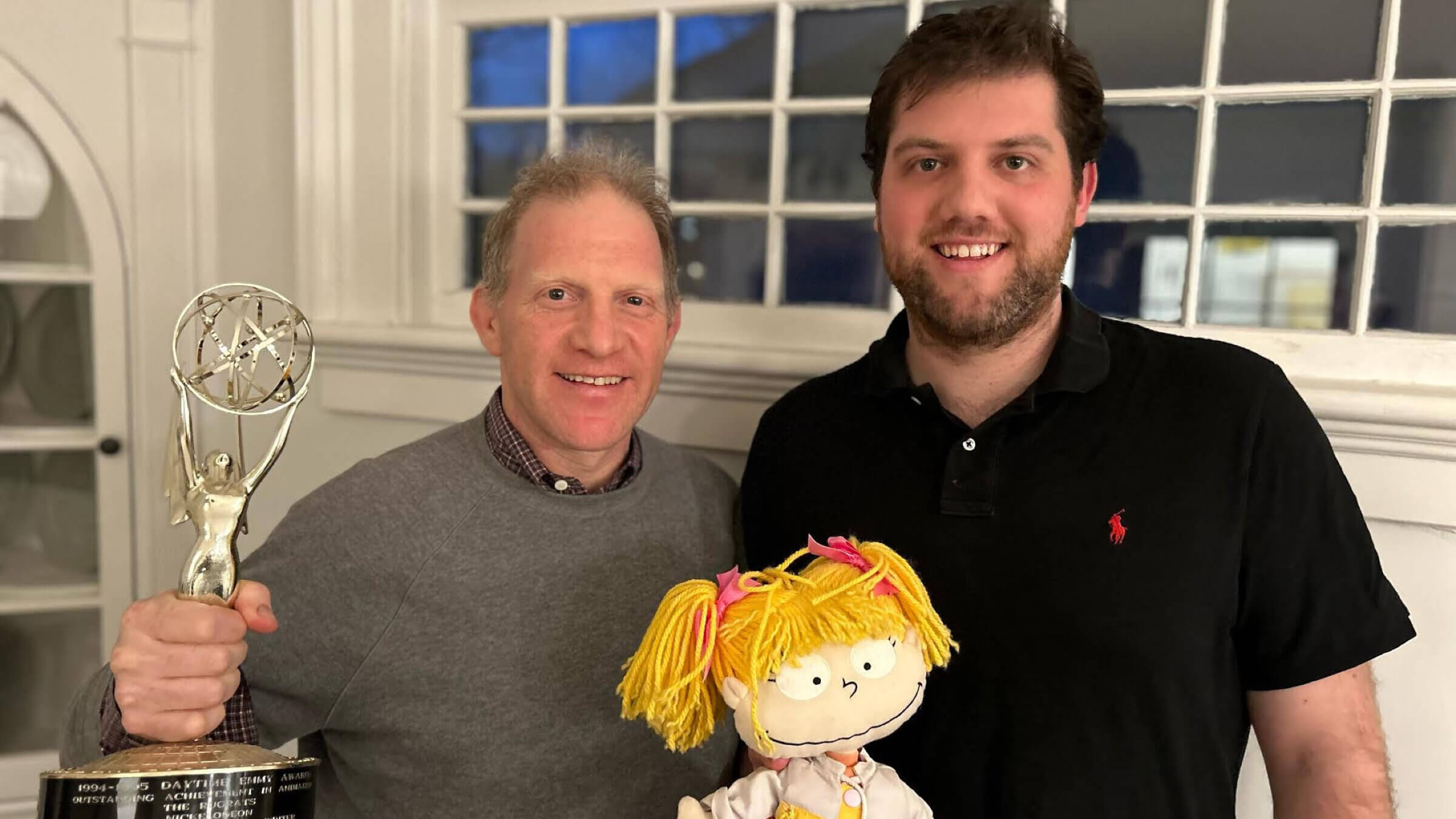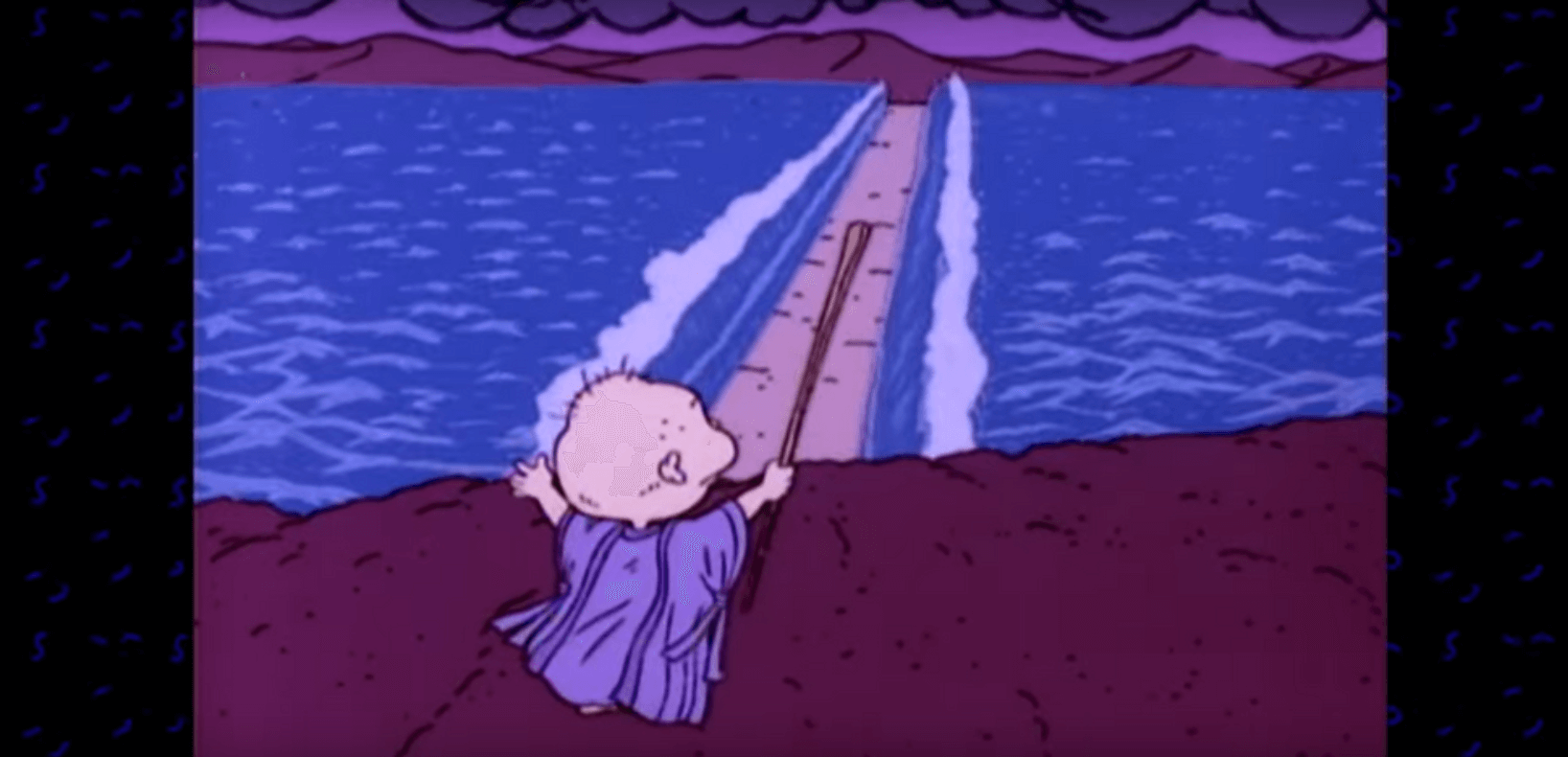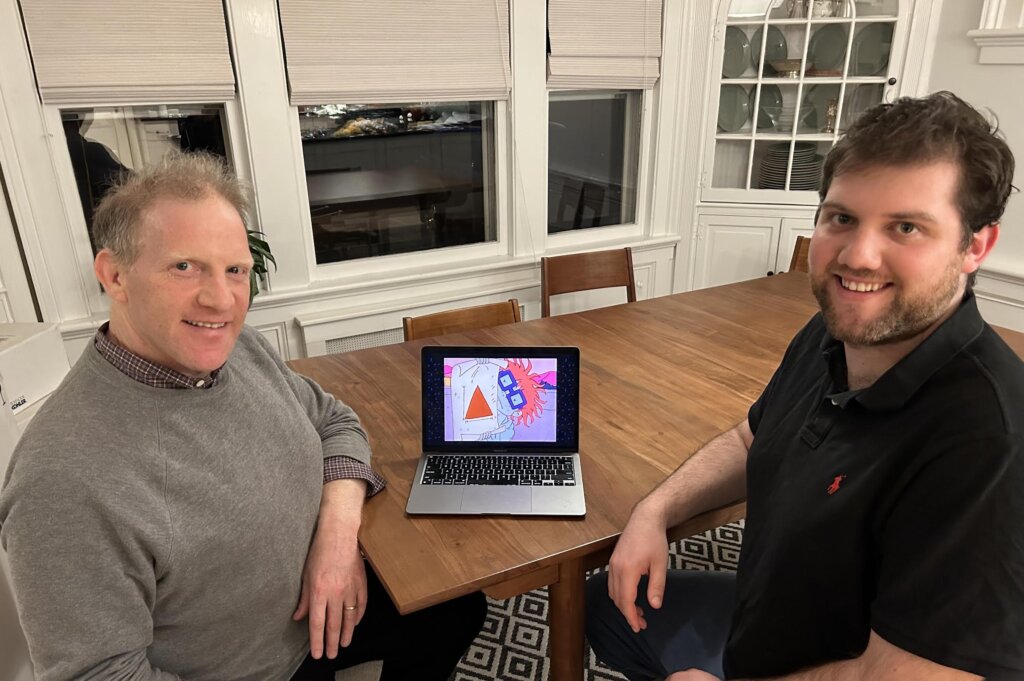My dad co-wrote ‘A Rugrats Passover.’ I had questions about it.
The episode is a cultural touchstone, and he’s proud of it. So why didn’t we watch it together?

Jonathan Greenberg, left, with the Daytime Emmy Award for the the Rugrats Passover episode, which he co-wrote, and his son Hank Greenberg. They stand before a stuffed version of Angelica, a Rugrats character. Photo by Megan Blumenreich
My father, Jonathan Greenberg, came up with the idea for “A Rugrats Passover” five years before I was born. He was a writer on what was then Nickelodeon’s most popular cartoon series when the show’s producers asked for a Rugrats Hanukkah special. He argued instead for a Passover special starring the animated cast of talking babies. It aired on April 13, 1995, in the second of the show’s 13 seasons.
The episode, in which the babies’ parents and grandparents moan and fight about the family Seder, was the highest-rated show in the network’s history, and nominated for an Emmy Award for outstanding animated program. For many millennial Jews, the episode — which moves the telling of the Passover from the Seder table to the attic, where Grandpa Boris regales the babies with a far more enthralling version of the story — became a Passover ritual. For many non-Jews, it introduced a holiday they knew little or nothing about.
I’m proud of my father’s work on the episode, but he was never eager to share it with me. I had to discover it for myself. My younger sister isn’t sure she’s seen it at all. She thinks she might have read a book version of it in Hebrew school. This Passover I put my longstanding questions about “A Rugrats Passover” to my father, who is now an English professor.
He told me that some of his answers reflect his current perspective, rather than what he remembers from nearly 30 years ago. My interview with him has been edited for length and clarity.
You start the episode with Angelica, a toddler, crushing up matzo in her car seat. Why?
Yes, this is Angelica deliberately making a mess. Part of what we wanted to do is set up why Passover is meaningful for people who don’t know Passover. It might not feel like what they think of as a big holiday, especially for kids. It’s not Christmas. It’s not even Hanukkah. It’s not a birthday. There’s no presents, but it’s gonna be fun.
Rugrats didn’t like trying to sanitize things and give you a false picture. Kids know when stuff is boring. They know that sitting around a table reading or listening to prayers is incredibly boring. You can’t just tell them that’s fun. They won’t believe you. We had to make it fun. Crumbling up matzo is fun.
Why did you want to do a Passover special instead of the Hanukkah special the network executives had asked for?
Passover is actually the most important Jewish holiday, except for maybe Yom Kippur. It shows what a Christian-centric world we live in. People just assume Hanukkah is the biggest Jewish holiday because the modern American version is modeled on Christmas.

What made the episode work?
Aligning the theme of “freedom” with the theme of “childhood.” A lot of childhood is about wanting to do stuff and not being allowed to do it. If you tell it right, the themes of Passover should have a natural resonance for kids.
I would say relative to a lot of other Rugrats stories, this one came together pretty easily. The Passover story is a very strong, easily understood narrative. For that retelling of Passover, we just used the Charlton Heston movie The Ten Commandments. We didn’t even have to look at the Haggadah. We just watched the film and did whatever they did in the 1950s. It was still like telling a Jewish story as a blockbuster.
Of the four writers on the episode, only Peter Gaffney was not Jewish. This might be a better question for him, but how did he contribute to the episode?
Peter knew the characters really well and it’s not like he never met a Jew before. He knew the story and the holiday. I don’t think anyone cared that he wasn’t Jewish.
I’m thinking that it would have been strange though, if you had a hand in writing about an important piece of Black culture, or another culture that was not your own?
It’s an issue that people care about more now than we did in the ’90s. It’s not that we didn’t care then, but we care more about it now. It’s interesting, but I think if a bunch of Christians or non-Jews wrote something really well-done and fascinating about Judaism, I would not have a problem with that.
Your question reminds me of a conversation from my James Joyce discussion group. There’s a great Jewish literary critic, Leslie Fiedler, who wrote that James Joyce’s Ulysses probably has the best Jewish character since the Bible. The first modern Jew in literature is written by an Irish Catholic. Leopold Bloom is totally convincing. A part of that is because Joyce wrote with sympathy. He made a real effort to learn about Jewish history and culture. It came across as real. He talked to Jewish friends. He read Jewish books.
Rugrats does Jewish representation well, but there also seemed to be some effort on the series to represent Black people.
Rugrats creator Paul Germain and head writer Joe Ansolabehere knew it was important. I think pretty early on they felt that Rugrats was already getting to be pretty white. They wanted to make a show more representative of what America looks like.
Many ’90s shows did not do that. There aren’t regular Black characters on Seinfeld, Friends, or even The Wild Thornberrys.
We weren’t perfect. Even in the Passover episode, we got flack for the grandparents, Boris and Minka. We got some flak from Jewish groups. It wasn’t a lot, but they felt it was stereotyping.
There’s also a joke in the scene where our 3-year-old Pharaoh receives presents from around the world. You probably couldn’t have the Chinese baby offering fortune cookies today. The idea was to convey our toddler Pharaoh’s sense of reality, and she would think the Chinese baby would bring fortune cookies. Even though it might be what a 3-year-old thinks, it’s a joke we probably wouldn’t do today.

How are your own feelings about Passover reflected in the show?
The Haggadah always felt like it had a problem to me. The Haggadah says the main thing to do is to tell the story, but during the Seder, there’s all this time wasted when you’re not telling the story. There’s so much talk about symbols and their meanings, but the actual story is supposed to be known already. If I could do a Haggadah my way, I would make it more like “Rugrats Passover,” where you would actually tell the story in a relatively brief and snappy and lively way. You wouldn’t spend that much time on saying “OK, now we eat the matzo with haroset and bitter herbs.”
If you see “Rugrats Passover” as your version of telling the Passover story, and if you believe telling the story in your own way is important, then why didn’t you sit down and show it to me? I don’t think my sister has even seen it.
She should see it. The question is more about me than Passover. It’s a hard question. I’m actually happy with how the episode turned out. I think it’s a good show. Here is the beginning of an answer: I feel like I was raised in a family where there was a lot of showing off. People were proud of things that they would accomplish. I became very self-conscious about getting people to notice my accomplishments or getting people to watch an episode I wrote. If people want to watch it, they will watch it. I won’t say “no.”
Your parents, your siblings and I are much more willing to promote your writing than you are.
I understand why my parents take pride in their children, even if my parents are a little over the top. Coming from a child, I understand why it’s appealing that your dad is connected to this thing that your friends know about.
Maybe part of the reason is that I feel like I really hit the jackpot to work at Rugrats. I was part of writing and rounding out the characters. I came up with stories and jokes and ideas, but it was Paul Germain’s creation, and Joe Ansolabehere also did a lot of intellectual work to make the show what it was. Of course, the other writers like Peter Gaffney, Rachel Lipman, Craig Bartlett, Mike Ferris, Steve Viksten, and Holly Huckins were all very talented. Everyone in the group gets the credit.
The Forward is free to read, but it isn’t free to produce

I hope you appreciated this article. Before you go, I’d like to ask you to please support the Forward.
Now more than ever, American Jews need independent news they can trust, with reporting driven by truth, not ideology. We serve you, not any ideological agenda.
At a time when other newsrooms are closing or cutting back, the Forward has removed its paywall and invested additional resources to report on the ground from Israel and around the U.S. on the impact of the war, rising antisemitism and polarized discourse.
This is a great time to support independent Jewish journalism you rely on. Make a gift today!
— Rachel Fishman Feddersen, Publisher and CEO
Support our mission to tell the Jewish story fully and fairly.
Most Popular
- 1

Fast Forward Ye debuts ‘Heil Hitler’ music video that includes a sample of a Hitler speech
- 2

Opinion It looks like Israel totally underestimated Trump
- 3

Culture Cardinals are Catholic, not Jewish — so why do they all wear yarmulkes?
- 4

Fast Forward Student suspended for ‘F— the Jews’ video defends himself on antisemitic podcast
In Case You Missed It
-

Culture How one Jewish woman fought the Nazis — and helped found a new Italian republic
-

Opinion It looks like Israel totally underestimated Trump
-

Fast Forward Betar ‘almost exclusively triggered’ former student’s detention, judge says
-

Fast Forward ‘Honey, he’s had enough of you’: Trump’s Middle East moves increasingly appear to sideline Israel
-
Shop the Forward Store
100% of profits support our journalism
Republish This Story
Please read before republishing
We’re happy to make this story available to republish for free, unless it originated with JTA, Haaretz or another publication (as indicated on the article) and as long as you follow our guidelines.
You must comply with the following:
- Credit the Forward
- Retain our pixel
- Preserve our canonical link in Google search
- Add a noindex tag in Google search
See our full guidelines for more information, and this guide for detail about canonical URLs.
To republish, copy the HTML by clicking on the yellow button to the right; it includes our tracking pixel, all paragraph styles and hyperlinks, the author byline and credit to the Forward. It does not include images; to avoid copyright violations, you must add them manually, following our guidelines. Please email us at [email protected], subject line “republish,” with any questions or to let us know what stories you’re picking up.














